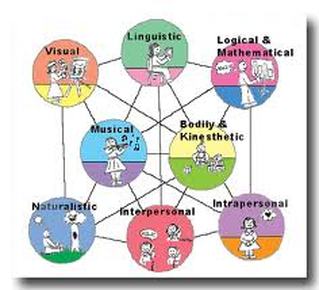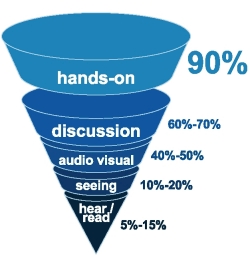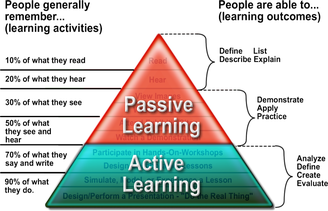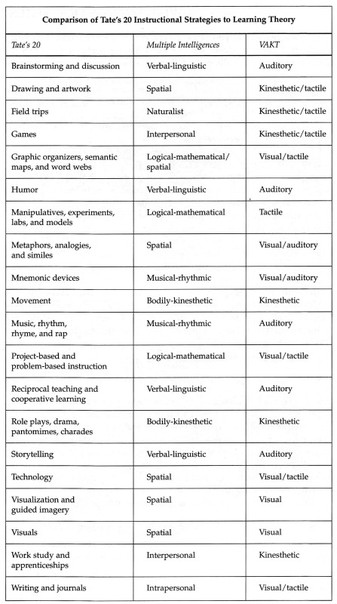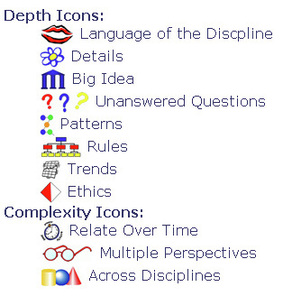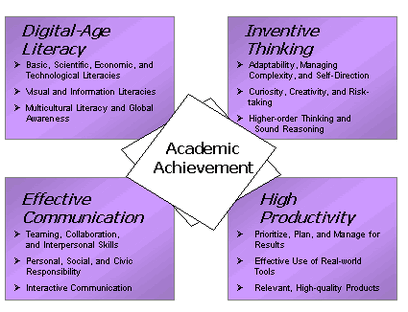Pedagogy
"I had to unlearn the idea that teaching was about my content;
I had to learn it was about their thinking"
Article about increasing intelligence from Scientific American
---------------------------------------
How does the brain learn?
--------------------------------------
-
Different Intelligences
. |
Two visuals to support independent learning
------------------------------
My Teaching Style
--------------------------
Emphasis on 21st Century Skills
Socratic Teaching
A form of inquiry and discussion between individuals,
based on asking and answering questions
to stimulate critical thinking and to illuminate ideas.
This activity concludes with a short piece of writing.
We usually start with the creation of the U.S.A. (Social Studies) and
an overview of the 30 human Rights as defined by the United Nations.
At the same time, we tackle some challenging fiction texts and articles
often focusing on perspectives and ethics.
based on asking and answering questions
to stimulate critical thinking and to illuminate ideas.
This activity concludes with a short piece of writing.
We usually start with the creation of the U.S.A. (Social Studies) and
an overview of the 30 human Rights as defined by the United Nations.
At the same time, we tackle some challenging fiction texts and articles
often focusing on perspectives and ethics.
Project-based Learning
Project learning is a dynamic approach to teaching
in which students explore real-world problems and challenges,
simultaneously developing cross-curriculum skills
while working in small collaborative groups.
An approach to learning focusing on developing a product or creation.
The project may or may not be
student-centered, problem-based, or inquiry-based.
Project Approach (Edutopia)
Necessary Skills
1. Self-Regulating 2. Cooperating (Working in groups)
3. Stating a Purpose 4. Asking Questions/Reflecting on those Questions
5. Debating about/Predicting 6. Planning 7. Researching
8. Drawing Conclusions 9. Creating a Presentation/Artifacts 10. Asking New Questions
in which students explore real-world problems and challenges,
simultaneously developing cross-curriculum skills
while working in small collaborative groups.
An approach to learning focusing on developing a product or creation.
The project may or may not be
student-centered, problem-based, or inquiry-based.
Project Approach (Edutopia)
Necessary Skills
1. Self-Regulating 2. Cooperating (Working in groups)
3. Stating a Purpose 4. Asking Questions/Reflecting on those Questions
5. Debating about/Predicting 6. Planning 7. Researching
8. Drawing Conclusions 9. Creating a Presentation/Artifacts 10. Asking New Questions
Inquiry-based
A student-centered, active learning approach focusing on
questioning, critical thinking, and problem-solving.
It's associated with the idea "involve me and I understand."
Information Age
.
questioning, critical thinking, and problem-solving.
It's associated with the idea "involve me and I understand."
Information Age
.
Problem-based Learning
An approach to learning focusing on
the process of solving a problem and acquiring knowledge. (Fosnot in Math)
(The approach is also inquiry-based when students are active in creating the problem.)
.
the process of solving a problem and acquiring knowledge. (Fosnot in Math)
(The approach is also inquiry-based when students are active in creating the problem.)
.
----------------
What is I.W.T.?
Independent Work Time: time for student selected activity
(in team or alone)
- Text with study guide (comprehension skills practice)
- Project (See Requirements)
- Conventions practice (grammar, spelling, punctuation)
- Vocabulary practice
(in team or alone)
- Text with study guide (comprehension skills practice)
- Project (See Requirements)
- Conventions practice (grammar, spelling, punctuation)
- Vocabulary practice
+
Universal Themes
Our children and students also learn best when they relate new information to things and ideas that are familiar.
We can help them with this by teaching universal themes/concepts.
By using this technique, we also help students to form “big ideas” that are transferred to future experiences.
Gifted students are capable of taking these big ideas in-depth and becoming quite complex with them.
This can actually be used as a differentiation tool.
- Rather than have kids just memorize math facts, show them the patterns of numbers. This will make the memorization much easier.
- Rather than learn a lot of historical facts—dates, names, battles—teach the concept of cause and effect. Then the dates, names, and battles will fall into place.
- When studying literature, instead of checking only for comprehension, discuss the theme of the book in relation to responsibility, or conflict, or survival.
Universal themes are broad and can include:
- Change
- Relationships
- Systems
- Conflict
- Power
